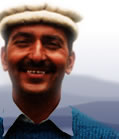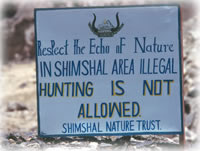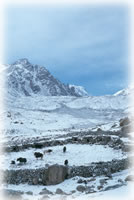 |
 |
||
 |
|||
|
RELATED THEMES education environment tourism traditional skills OTHER LOCAL THEMES BACKGROUND |
environmental knowledge
Two particular community initiatives illustrate the importance of environmental knowledge: the Environmental Education Programme (EEP) and the Shimshal Nature Trust (SNT). Both aim to demonstrate, preserve and improve the community's knowledge of the environment.
The Shimshal Nature Trust is an organised response by the community to the threat posed by the Khunjerab National Park (KNP). The premise for the KNP plan was that local populations and their livestock were a threat to the environment, particularly wildlife, and thus needed to be controlled in terms of limiting their access to certain areas. Shimshalis objected to this assumption, given that this was the environment that they had depended on, and had a close relationship with for hundreds of years. To prove this, the SNT developed its own management plan, in the style of the official park plan, to communicate the fact that they, the community, were in fact were the best people to be looking after their surrounding environment and wildlife. The management plan demonstrated that their traditional rotational grazing systems avoided overgrazing or exploitation of resources in any one particular area, and that hunting for wildlife was in fact regulated by traditional norms. The SNT also laid out their plans for the future in terms of developing barren land for agriculture and fodder purposes (as described in Pakistan 16) to further reduce pressure on the existing pastures. Most importantly, the SNT wanted to demonstrate its commitment to sustainability and the likely success of an environmental management plan devised and delivered by and for the community, rather than by an external agency. Shimshalis have developed keen husbanding skills to make the most of what's available in terms of clothing, food and shelter. Those described in the testimony include hunting, herding and pasture management. The hunting skills of the past illustrate people's knowledge of the surrounding mountainous area and the movement of wildlife within that. Today hunting is prohibited and Raza (Pakistan 34) describes the loss of status of hunters in recent times: "Not only in our village but in the entire country (Pakistan) the wildlife are protected through national parks and through community-based organisations in their respective areas, and hunting has been banned all over the country to protect the wildlife from extinction. In former times the hunters were rewarded with the title of siyod (great hunter) but today he is liable to penalty or trial if he violates the ban on hunting [and he could be] sent to prison…" Knowledge of the pastures as a resource base for livestock is clearly demonstrated in Laili's interview (Pakistan 16). Laili has been a shpun (herder) for 15 years and has an intimate knowledge of the dozens of pastures used by the villagers for grazing their livestock. He is concerned about the current livestock numbers and the ability of the pastures to provide adequate grazing for them. He suggests lowering the number of livestock and developing barren land in the pastures through the construction of irrigation channels. Aside from knowledge of the pastures, a good awareness of the environment is required for safe travel, in terms of the journey to the pastures and in and out of Shimshal. Several testimonies contain accounts of journeys in the past which were long and often dangerous. quotes about environmental knowledge"Surely there might be some advantages [of the KNP] but for the people of Shimshal it would not be very beneficial because our entire subsistence depends upon the livestock. We sell our livestock and out of this money we educate our children and meet our day-to-day expenses. We have our agriculture land at Pamir as I mentioned earlier, it will be confiscated if it is formed as the National Park. Secondly we have no highly educated persons that will occupy the higher positions in the National Park. People will come from outside and will rule us, sure! A few services will be offered to us but as a whole the National Park will not benefit us… Pamir is part of our life." "…we all think that the Shimshal Nature Trust is not a new thing or an innovation. It is a bridge between inside and outside the village. It is just putting into writing the local traditional practices. It is just taking the indigenous experiences to the modern people…we realised that the indigenous wisdom and practices are… more environmentally sensitive… We think it is more important to understand the people's feeling of their surrounding than articulating regulations and imposing restrictions…" "Last year they (the school students involve in the EEP) presented their research in Gilgit. To the government education department, and AKES and also people from WWF and IUCN joined the symposium. So that was a very exciting event for the students…. Actually they (IUCN and WWF) were surprised and a bit shocked. The surprise was that such a remote village has promoted such a good environmental project and has collected so much information about their valley. And they said this is the real education, or the way to educate students. And they were shocked that they haven't done anything like that themselves." "The way of social control here is that this is a mergachjai, a place of spirits, which means a lot to people and people have to respect that…we don't require rewards and punishment or guns to control people about what's wrong and right… And this is you know the most satisfying thing for us, the people who hunt say it is like an addiction, they love hunting. But we were lucky: from the day the community, decided that okay we will stop hunting, we witnessed that those people, they never hunted again, and that was without reward, that was without punishment, that was without fear." "…hunting was the favourite pastime of the people in former times. The individual did not consume the game but it was distributed among the community members. The hunters were named as pehlawan (hunter) and respected in the society… Because they would feed the people with their game and people were thankful to them. It was the time of poverty, in some places people in the pastures would not find anything to feed their children. In such situations hunters would feed the people with their games. At that time there was no restrictions on hunting and people would enjoy hunting and would joyfully describe all the events of their hunting excursions." "It would be a very time consuming and hard task to construct channels for the barren places, but I think it would be very good long-term planning for the future generation. We have enough pastures in Shimshal, but unfortunately the growth of grass is very less. I am sure if channels are constructed in some of the pastures - where it is possible - this will help us to overcome the problem." "The foreign consultants who were hired by the local government to work on wildlife conservation understood that the local people have more knowledge and credibility than the government officials… the local people "practically" know about their environment whilst the government officials' knowledge is theoretical. Realising this, the foreign consultants started backing SNT's motive in all seminars and symposiums and convinced the international organisations to support locals' ideas in the field of conservation. Because the local people have a vast knowledge compared to the government." "…traditionally hunting in the breeding season was completely banned. The person who would hunt, by mistake, a female or pregnant animal were disliked and admonished by the community and sometimes socially boycotted (by rejecting the meat of the game). It was acceptable to hunt the old animals, it was an established system. They had made the hunting practices and the wildlife part of their culture… For example they would express [their attachment to the wildlife] in their folk songs and cultural events as a means of reminding the people…about the ethics of hunting and reiterating their attachment to their environment…" |
|
 This collection does not contain the kind of environmental knowledge of other collections in terms of the names and descriptions of local plants and their uses. However, knowledge of the surrounding environment and resources is evident from the testimonies. Given Shimshal's relative isolation it has been in the community's interest to manage its environmental resources in a sustainable way (for both self-sufficiency and the sustainability of the environment it depends on).
This collection does not contain the kind of environmental knowledge of other collections in terms of the names and descriptions of local plants and their uses. However, knowledge of the surrounding environment and resources is evident from the testimonies. Given Shimshal's relative isolation it has been in the community's interest to manage its environmental resources in a sustainable way (for both self-sufficiency and the sustainability of the environment it depends on). The EEP was initiated as a result of an exchange between a group of Japanese students and a group of young Shimshalis. It involves school children in the collection of data and experiences about various aspects of their environment. There are 10 committees: population, daily life, agriculture, politics and economics, festivals, nature, livestock, tourism, weather and history.
The EEP was initiated as a result of an exchange between a group of Japanese students and a group of young Shimshalis. It involves school children in the collection of data and experiences about various aspects of their environment. There are 10 committees: population, daily life, agriculture, politics and economics, festivals, nature, livestock, tourism, weather and history.